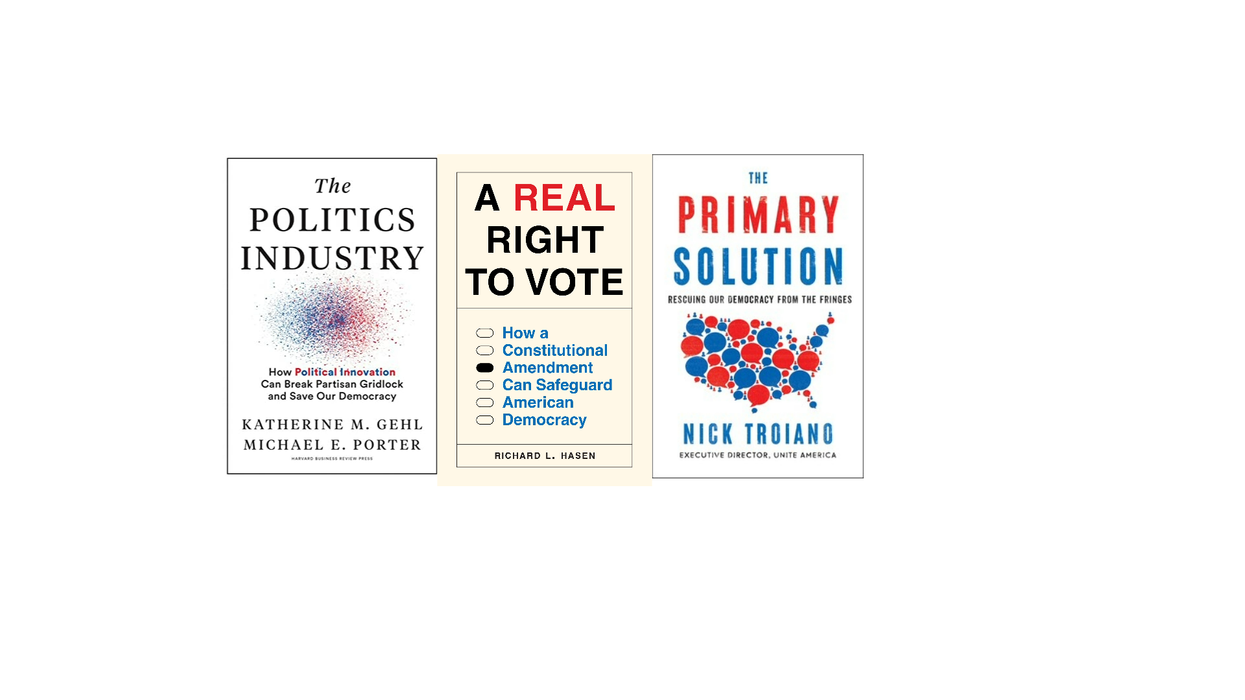LaRue writes at Structure Matters. He is former deputy director of the Eisenhower Institute and of the American Society of International Law.
Looking for a good book to give or read over the holidays? Want one that can deliver hope and perspective before the primaries kick off election-year frenzy, if not depression? Here are a few that do just that, from offering reminders that the nation always digs itself out of the polarized holes it creates to charting viable possibilities for the future of our democratic republic.
Robert Putnam’s "The Upswing ” (2020) is a good place to start. He strengthens the cyclical frame many analysts use to explain political periods by describing the pattern as being an upward, diagonal spiral rather than a mere pendulum swaying from progress to retrogression and back. His is a compelling case that the U.S. cycle is nearing its next low point. (the prior one was just before The Progressive Era started what would become a half-century of notable progress)
Treating the symptoms of today’s political divisions is vital but ultimately incomplete; the causes also require attention and repair, the deepest of which are constitutional. The fact that amendments happen at all can inspire as well as discourage, which Jonathan Kowal and Wilfred Codrington reveal in "The People’s Constitution ” (2021). They entertainingly inform the full history of amendments and bring to light the conditions necessary to achieve or pursue such change. For example, the Constitution has commonly been called “impossible” to amend or “unamendable” as little as a decade and a half before it is amended, as occurred in the Gilded Age before amendments in 1913 gave us an income tax and direct election of senators.
For a fascinating thought experiment on amendments, Beau Breslin’s "A Constitution for the Living ” (2021) posits what American history may have looked like had constitutional conventions been scheduled as Thomas Jefferson preferred. Wisely, Breslin’s schedule (five in 230 years) is not as frequent as Jefferson suggested (one every generation), and his rich counterfactual offers retrospective insights on what big national change could look like.
And critical notions that are not constitutional can still be foundational. Richard Haass’s "The Bill of Obligations ” (2023) posits a Bill of Rights equivalent for the roles and duties of citizenship. The success of our democratic enterprise rests on public involvement in civic affairs, and Haass tightens our understanding of such needs by articulating 10 of them, from being informed and getting involved, to rejecting violence and valuing norms.
Voting is fundamental to democracy, and thus understandably central to many books and proposals related to electoral reform (disclosure: including my own). Election law expert Richard Hasen will publish "A Real Right To Vote ” early in 2024 (available by pre-order), arguing for an amendment guaranteeing the right to vote. Hasen has long advocated for an affirmative amendment, describing why it would be more effective than the hodgepodge of “negative” amendments we have now that assert that the right to vote cannot be denied on this or that basis. Daniel Ziblatt and Steven Levitsky also lead their recommendations in "Tyranny of the Minority ” (2023) with such a proposed amendment.
E.J. Dionne Jr. and Miles Rapoport take a different approach, advocating for universal civic duty voting (“ 100% Democracy,” 2022). They argue for adapting the mandatory voting successfully used in Australia, Belgium and elsewhere to increase turnout consequentially and thereby solidify the foundational base for the government erected above it. They do so while still preserving voters’ right not to vote (i.e., “none of the above”) or write in their own candidates.
There are plenty more books to recommend, such as Robert Alexander’s "Representation and the Electoral College ” (2019), which provides an informed critique of this antiquated, anti-democratic institution, and stands with those by George Edwards and Alexander Keyssar. And, for solutions to the corrosive problem of partisan primaries empowering political fringes, there is "The Politics Industry ” (2020) by Katherine Gehl and Michael Porter. Nick Troiano will build on their work in his forthcoming "The Primary Solution ” in 2024 (also available via pre-order).
The good news is that such forward thinking is happening now. The stage is being set. The meaningful through-lines from today’s democratic struggles to tomorrow’s democratic vision are not one-directional; they are only created through their interaction and need for each other.
Happy holidays, and happy reading.






















Trump & Hegseth gave Mark Kelly a huge 2028 gift